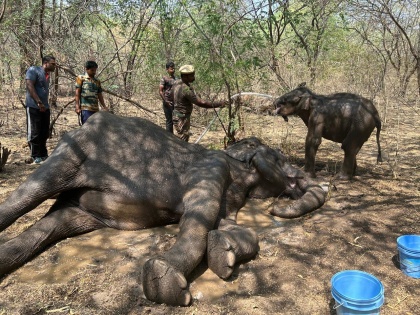Elephant Found Dead in Tamil Nadu: Extreme Heatwave Probable Reason
By Lokmat English Desk | Published: April 12, 2024 02:12 PM2024-04-12T14:12:54+5:302024-04-12T14:14:38+5:30
In a forest area within the Sathyamangalam Tiger Reserve, a female wild elephant, believed to be aged between 45 ...

Elephant Found Dead in Tamil Nadu: Extreme Heatwave Probable Reason
In a forest area within the Sathyamangalam Tiger Reserve, a female wild elephant, believed to be aged between 45 and 50 years, passed away on Thursday. During a routine patrol on Thursday morning, forest personnel discovered the elephant lying unconscious at Pudukuiyanur village in the Vadavalli area of the Sathyamangalam Forest Range and immediately informed senior officials. A calf, estimated to be between two and three years old, was found nearby.
A team led by S. Sadasivam, a wildlife veterinarian from the Sathyamangalam Tiger Reserve, administered treatment to the elephant. However, despite their efforts, the elephant did not respond to the treatment and succumbed to its condition. The calf was successfully reunited with a herd, and a specialized team continued to monitor the herd's movements using drones.
On Friday, a postmortem examination was conducted in accordance with the Tamil Nadu Elephant Death Audit Report (EDAF) to ascertain the exact cause of death. Samples of vital organs were collected for further laboratory testing.
K. Rajkumar, Conservator of Forests and Field Director at the Sathyamangalam Tiger Reserve, stated to The Hindu that elephant mortality typically increases between March and June each year due to various factors, including pre-existing health conditions exacerbated by the summer heat. Additionally, soaring temperatures in Tamil Nadu have been identified as a potential contributing factor to the recent mortality.
The India Meteorological Department (IMD) has issued warnings of heat wave conditions in specific regions, including Tamil Nadu, interior Karnataka, Telangana, Odisha, Jharkhand, Gangetic West Bengal, Coastal Andhra Pradesh, Yanam, and Rayalaseem. Few days ago two elephants reportedly died due to suspected dehydration and heatstroke. The two tuskers both males, reportedly wandered over 50 kilometres (km) in search of water till finally succumbing to thirst in Ramanagara district, barely 35 km from the metropolitan area of Bengaluru.
The carcass of the first elephant, a 30-year-old individual, was found in Yalavanatha village. It is located in the Kanakapura taluk of Ramnagara district. The second elephant, a younger male of age 14 years, was found dead in Bettahalli just as few kilometres away.Widespread death of animals dying of thirst and hunger hasn’t been reported in Karnataka currently. Scientists from the Centre for Ecological Studies at the Indian Institute of Science Bengaluru confirmed that dry forage might have triggered the elephants’ deaths.
Bengaluru recorded its highest temperature in five years on March 29, prompting the India Meteorological Department to issue a heatwave alert. The situation has not improved a bit in the last 10 days or so, with weather watchers stating that Ramanagara, which is at the fringe of the Bengaluru metropolitan area and about 200 km from Bengaluru proper, is likely to be under extreme heat conditions, recording over 40 degrees Celsius (°C)
Open in app